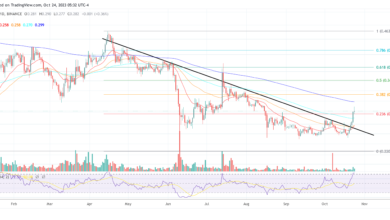Polygon pens open letter to European Parliament: All you need to know

- Polygon’s letter was aimed at clarifying the potential negative consequences of imposing a requirement for “safe termination or interruption.”
- MATIC’s weighted sentiments declined, but demand in the futures market went up.
On 17 April, Polygon [MATIC] sent an open letter regarding Article 30 to the Representatives of the European Parliament, the Council of the European Union, and the European Commission.
1/ 🚨Today @0xPolygonLabs published an open letter to the EU on Art. 30 of the #DataAct, which could have serious consequences for permissionless smart contracts. @Ledger has joined in proposing amendments to narrow Art. 30 to protect decentralized software development. Read 👇 pic.twitter.com/AZHGCm14sQ
— Rebecca Rettig (@RebeccaRettig1) April 17, 2023
Read Polygon’s [MATIC] Price Prediction 2023-24
Understanding Polygon’s motive
Let’s first understand what Article 30 is. Article 30 of the EU General Data Protection Regulation (GDPR) is a law that:
Requires organizations that process personal data to maintain a record of their processing activities.
Article 30 imposes requirements on:
(A) party offering smart contracts in the context of an agreement to make data available.
As all smart contracts share some sort of data, the proposed law is over-broad and likely unenforceable in decentralized systems. Polygon drafted the open letter to clarify the scope and intent of Article 30 to ensure it accounts for how smart contracts operate.
It was also aimed at clarifying the potential negative consequences of imposing a requirement for “safe termination or interruption” of such smart contracts in permissionless systems.
Polygon’s suggestions
Polygon further suggested changes to narrow down the scope of Article 30. The intention behind it was that the article only affected permissioned smart contract-based systems that are owned and run by identifiable natural persons or corporate entities that have signed customary contractual agreements for the sharing of “personal data,” as that term is used in the Data Act.
The letter mentioned:
We offer suggested revisions to certain language of Art. 30 to ensure the final text reflects the EU’s objectives for this provision—namely, removing barriers to the development of the European data economy in compliance with European rules and fully respecting European values, and in line with the mission to reduce the digital divide so that everyone benefits from these opportunities.
According to the letter, Polygon wants to make sure that software developers worldwide, including those in the European Union, can keep innovating with smart contracts.
A quick look at MATIC
While Polygon drafted the letter, its native token witnessed a price correction. MATIC’s value declined by over 1% in the last 24 hours. According to CoinMarketCap, at the time of writing, it was trading at $1.17 with a market capitalization of more than $10.7 billion.

Source: CoinMarketCap
Is your portfolio green? Check the Polygon Profit Calculator
MATIC is in demand in the futures market
A look at Santiment’s chart revealed that sentiments around MATIC have turned negative lately, as evident from its weighted sentiment. Nonetheless, the increase in the Binance funding rate indicated that MATIC’s demand in the derivatives market was high.
CryptoQuant’s data also pointed out that MATIC’s exchange reserve was decreasing, which was a positive signal as it suggested a decline in selling pressure.

Source: Santiment





